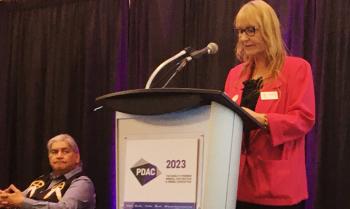Image Caption
Summary
Local Journalism Initiative Reporter
Windspeaker.com
Kathy Lajeunesse can talk for hours about success stories that have been spawned by the Keepers of the Circle.
Lajeunesse is the program practitioner for the not-for-profit organization that was launched in 1997.
The northern Ontario-based organization, which has offices in Kirkland Lake and Temiskaming Shores, has worked with Indigenous women for more than a quarter century to help them pursue careers in mining exploration and development.
Lajeunesse chaired a presentation on March 7 at this year’s Prospectors & Developers Association of Canada (PDAC) convention staged in Toronto. The four-day event concluded on March 8.
The PDAC convention, first held in 1932, is the world’s premier mineral exploration and mining convention. More than 23,000 delegates attended this year’s event held at the Metro Toronto Convention Centre.
The presentation Lajeunesse chaired was titled ‘Why Indigenous women in mining is a golden opportunity’.
“Although women are increasingly entering the mining sector, the sector still remains male dominated,” Lajeunesse said. “Go figure.”
Keepers of the Circle has grown tremendously over the years. It started in a one-room office but now features two centres equipped with daycares, Indigenous health care centres and a training sector.
The organization has also expanded its programming and services over the years to fill the gaps, adding pre-employment training for newer skill trades in green construction, clean energy, food and agriculture.
When it comes to employing people in mining, Lajeunesse said countries around the world average between a seven per cent and 18 per cent female workforce.
“And for Indigenous women, the number is so much lower,” she said.
Keepers of the Circle provides training programs, usually featuring 10 to 15 Indigenous women that are guided by a pair of co-facilitators and an Elder to provide wisdom and guidance.
Almost 500 Indigenous women have taken the organization’s pre-employment mining program over the years. And 364 of those women found successful employment.
“One of the biggest challenges faced by women who work in the mines is gender-based violence and harassment, both above and below ground,” Lajeunesse said. “This is despite the mines and all their safety practices, policies that are in place and safety being such a big factor.
“This is where Keepers of the Circle comes into play to ensure that Indigenous women are put into safe work environments, both physically safe and culturally safe. We work with our partners to assess the work environments and the cultural competence.”
Lajeunesse believes more mining companies would benefit by hiring Indigenous women.
“There is a golden opportunity folks, here for mining companies to take advantage of the untapped potential of Indigenous women and support their pathways for them to take on roles in the mining sector,” she said. “Creating a diverse workforce has shown to improve company culture, performance and economic returns.”
Lajeunesse believes there are other spinoff effects when women are employed in the mining sector.
“It helps heal and rebuild the communities,” she said. “When we know more, we can do more. Women are keepers of the traditional ecological/environmental knowledge and culture, passing it down to the next generation through their oral storytelling.
“As the backbones of their community, Indigenous women draw their strength from adversity. They’re innovative, loyal and above all have a great sense of humour. With proper support, Indigenous women are motivated and demonstrate an abundance of leadership qualities.”
Lajeunesse said Indigenous women have a preference for staying in their home communities.
“Thus, they will show a long-term commitment to the mine,” she said.
Lajeunesse, however, is also well aware that some Indigenous women have plenty of barriers to employment. But Keepers of the Circle is addressing these concerns by providing support to overcome barriers, which include childcare, transportation, Internet, accommodations and food.
“Our approach is that we work with the understanding that Indigenous women are some of the most marginalized people in our society,” she said. “Our skills training programs focuses on personal and professional development and we make sure that culture is integrated at the root of all things.”
Lajeunesse said Keepers of the Circle officials are keen to expand their training program nationally in the coming years.
“We want to see Indigenous women participating in careers in mining across Canada, not just northern Ontario,” she said, adding her organization is looking to expand its partnership network.
“We believe that by collaborating with our partners we can restore the balance of Indigenous women’s roles within communities as contributors to economic development and ensure that Indigenous communities are equipped for sustained long-term resilience.”
For more information on Keepers of the Circle go to Keepers of the Circle – An urban Indigenous Hub serving Indigenous women and their families across Ontario
Never miss a Windspeaker article. Subscribe Today to our new Windspeaker Newsletter!
Local Journalism Initiative Reporters are supported by a financial contribution made by the Government of Canada.

